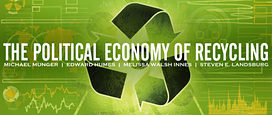Here are my final thoughts in response to Michael Munger (whom I hope to meet sometime; he seems like an intelligent, funny guy).
Munger has noted in his essays some of the most ridiculous recycling scenarios that are at work in the United States. Who can look at them and not want to throw the whole idea of recycling in the trash? In Munger’s latest essay “Recycling is a Red Herring,” he’s correct in pointing out the lunacy of well-paid municipal workers pawing through people’s trash to find recyclables. Perhaps ironically, I do support unpaid college students (participating in a research project) pawing through trash for waste composition studies, a highly informational endeavor to indicate what products are ending up in the trash more than others. States use this information to determine solid waste policy, potential bans of materials from landfills, need for future organics collections, and so forth.
Instead of anecdotal stories, which are admittedly more fun to read, I prefer to focus on facts and solutions, and not ones that fall so easily into common preconceptions of the left or right points of view. I actually believe that this is why my organization, Recycling Reinvented, which supports producer-driven, mandated recycling for valuable materials, has been having such interesting conversations with policymakers on both sides of the aisle on how this kind of recycling paradigm shift could benefit their states. Those on the left like the financial assistance to local governments as well as the environmental benefits of decreased landfilling and air quality improvements from less burning. Those on the right like the industry developing and running the system, with a downsizing of government’s role in recycling.
A colleague of mine noted to me that Munger often ignores the elephant in the room, the externalities related to landfilling versus recycling. Especially important is methane, which is 24 times more potent than CO2 and its related greenhouse gas emissions impact. If these essays are really intended to delve into the economics of recycling, then these externalities need to be accounted for. No, it’s not alright to just throw everything into the trash and wait for the magical recycling fairy to come along and market all the valuable recyclables. Landfills and incinerators cost taxpayers many millions of dollars, with large subsidies that are huge externalities. A recent article in Minnesota’s Pioneer Press[1] noted that if their Newport plant “burned 30,000 dollar bills every day for 19 years, that would almost equal the $219 million in public subsidies it has received through 2013.” These externalities need to be internalized by manufacturers, getting the general taxpayer out of the subsidization game.
Munger states, “We need to be working on the waste management equivalent of the Salk vaccine: prevent the creation of a massive and expensive waste stream at the source. We have to change the incentives so that manufacturers are responsible for the waste they create, the packaging they use to move products, the containers they use to hold liquids, food items, and consumer goods.” He goes on to say that “I have been criticized by my colleagues in this exchange for being cryptic, unclear, or simply unwilling to offer specific solutions.” He actually just stated the answer, the same one I am advocating for; we’re just using different phrasing. He calls them incentives for manufacturers, and I call it producer-driven recycling, but they would have the same purpose. If all manufacturers agreed to do it, we wouldn’t need legislation to avoid the free-rider issue. Alas, that doesn’t seem to be happening, so mandated it is.
I also agree with Munger on all of the following points:
- We need to produce less garbage in the first place – Yes!
- We need to make packaging more reusable – Yes!
- If we ask the right question—not how to recycle garbage, but how to prevent garbage’s existence—we might make progress – Yes!
- Too many people, and too many large powerful corporations, have a financial stake in the status quo – Yes!
And most importantly, recycling is a red herring, “a way of letting manufacturers and the groups that create garbage avoid responsibility—financial, political, and moral—for the mess they are making”—Agreed! Let’s get to work on this. How about we start in North Carolina?

